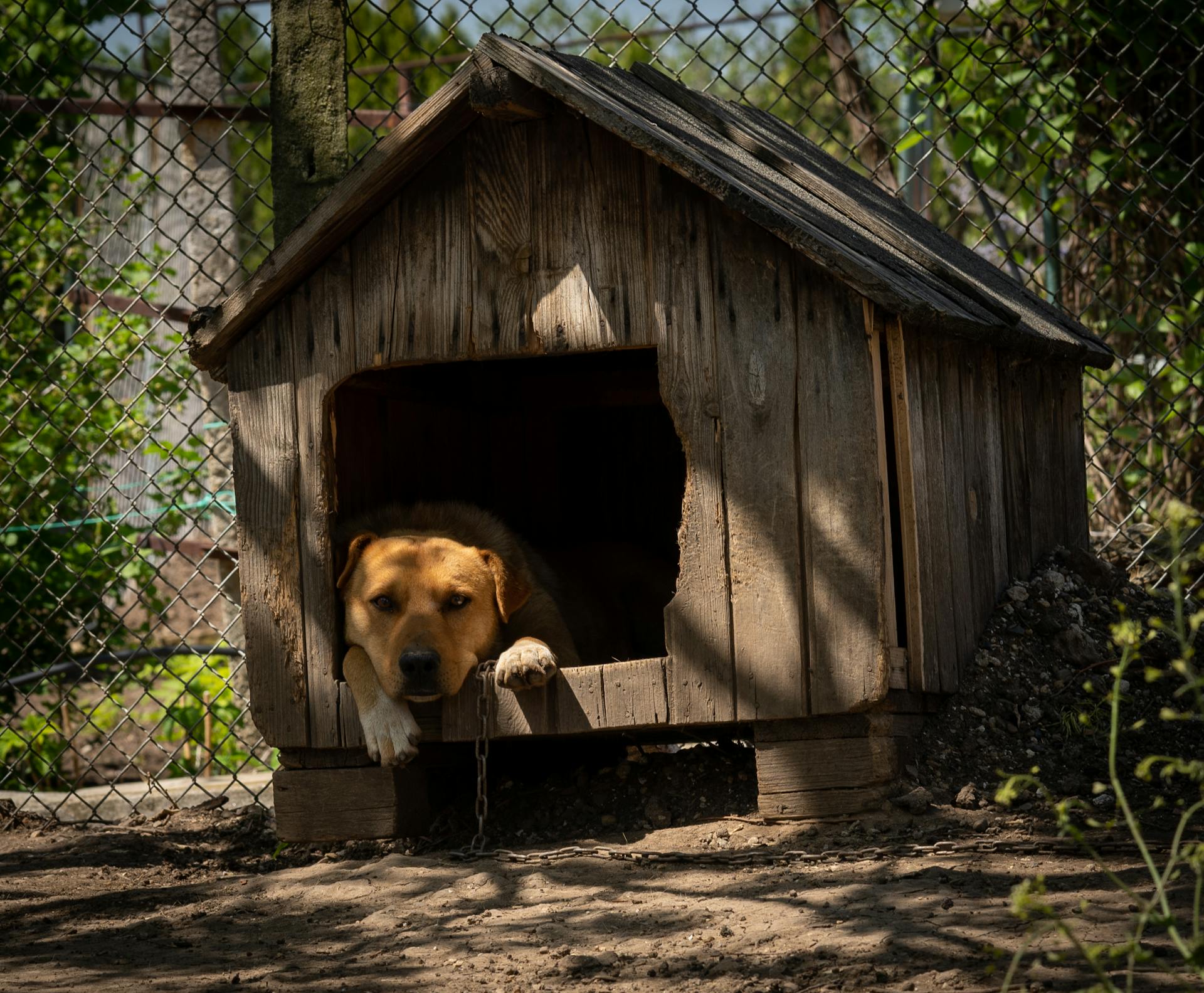
Boarding your dog for the first time can be a daunting experience, but with some preparation and knowledge, you and your furry friend can make the most of it.
Choosing the right boarding facility is crucial, as it directly affects your dog's comfort and safety. Research local options and read reviews to ensure you find a reputable and well-reviewed facility.
A minimum of 30 days' notice is often required for boarding, so plan ahead and book your dog's stay well in advance. This allows the facility to accommodate your dog's needs and make any necessary arrangements.
The cost of boarding varies widely depending on factors such as location, amenities, and services offered. On average, you can expect to pay between $20 to $50 per day.
Recommended read: Why Are My Dog's Nails Splitting?
Before You Board
Before you board your dog, consider whether they have the right temperament for staying at a boarding facility.
Dogs that don't enjoy the company of other dogs will need a boarding facility that keeps them separate.
Each dog is unique, so matching a boarding facility's amenities with your dog's needs is crucial for a successful stay.
Dogs with separation anxiety need extra preparation before being boarded, which can include spending time at the new facility to acclimate and get to know the staff.
Choose a facility that allows trial visits and is willing to spend the extra time needed to help your dog feel more comfortable.
Consider reading: Are Portuguese Water Dogs Good for First Time Owners
Choosing a Reputable Facility
Contact friends, relatives, and other dog owners for advice on finding a reputable boarding facility. Personal experiences and recommendations can provide useful information about the quality of care offered by various facilities.
The internet is a wealth of information, and it can lead you to reviews, testimonials, and even images or videos of boarding facilities. Take the time to explore several possibilities and read reviews to get a sense of each facility's strengths and weaknesses.
A reputable boarding facility should have prevention and emergency measures in place, including up-to-date vaccinations, continuous parasite prevention, emergency veterinary care readily available, and a disaster plan.
Readers also liked: Cockapoo Care
Here are some key factors to consider when evaluating a boarding facility:
- Requiring up-to-date vaccinations and continuous parasite prevention
- Having emergency veterinary care readily available or a plan in place to get emergency care for any pets that need it
- Having a disaster plan (e.g., fires, natural disasters, etc.)
- Following standard operating procedures to minimize risk of illness outbreaks
These measures will help ensure your dog's safety and well-being while in their care.
Facility Evaluation Criteria
Choosing a reputable dog boarding facility is crucial for the well-being of your furry friend. You should start by researching and choosing a reputable facility.
Ask friends, relatives, and other dog owners for advice, as personal experiences and recommendations can provide valuable information about the quality of care offered by various facilities. The internet is also a wealth of information, where you can find reviews, testimonials, and even images or videos of boarding facilities.
Take the time to explore several possibilities, read reviews, and visit their websites for more information. This will help you make an informed decision about which facility is best for your pet.
To evaluate a facility, look for the following key criteria:
By considering these factors, you can ensure that your dog receives the care and attention they need while you're away.
Proof of Vaccinations Required?

Some boarding facilities may not require proof of vaccinations, but it's best to choose a kennel that does. Paoli Vetcare, for example, requires all dogs to be up-to-date on vaccinations.
At a kennel that doesn't require shots, the risk of infectious disease and intestinal parasites would be high, making it a less desirable option.
A reputable boarding facility will require all of their dogs to be current on certain vaccines, which typically include DAPP, Rabies, Leptospirosis, Bordetella, and Canine Influenza Virus (CIV) vaccines.
The DAPP vaccine protects against Distemper, Adenovirus type 1 (Hepatitis), Adenovirus type 2 (respiratory), Parainfluenza, and Parvovirus, and should be boosted periodically, with the frequency determined by your veterinarian.
The Rabies vaccine is mandated by state laws and required every 1 or 3 years, depending on your location.
To ensure your dog's boarding experience goes smoothly, make sure you understand and follow the health guidelines of the facility.
Worth a look: Lump after Rabies Shot Dog

Here is a list of the typical vaccines required by reputable boarding facilities:
- DAPP (Distemper, Adenovirus type 1, Adenovirus type 2, Parainfluenza, and Parvovirus)
- Rabies
- Leptospirosis
- Bordetella (Canine Kennel Cough)
- Canine Influenza Virus (CIV)
By choosing a boarding facility that requires proof of vaccinations, you can help safeguard your dog and the other canines at the facility from potential infections.
Staff Certification
Staff Certification is a crucial aspect to consider when choosing a reputable facility for your dog's boarding needs. You want to ensure that the staff is experienced and qualified to care for your pet.
Inquire with the owners and staff of a facility to ensure they have the experience and credentials required to manage the dog boarding facility. For example, Paoli Vetcare's staff is Fear Free certified, using methods and protocols that reduce anxiety triggers and create a safer experience for all involved.
Certification can give you peace of mind knowing that the staff is trained in proper animal care and handling. This can be a significant factor in determining the overall quality of care your dog will receive.
Here are some certifications to look for in a boarding facility:
- Fear Free certification
- Other certifications that demonstrate expertise in animal care and handling
A certified staff can make a significant difference in the comfort and well-being of your dog during their stay at the facility.
Preparation and Planning
To make the boarding experience smooth and enjoyable for your dog, start introducing them to new situations and environments a few weeks before their stay. This can be as simple as taking them on short trips to pet-friendly cafes or parks.
It's also essential to ensure your dog has received basic obedience training, which can include simple commands like sit, stay, and come. This will help them listen to directions and behave correctly in a new setting.
Consider booking your dog's boarding stay one month in advance, or at least two or three weeks prior to their stay. This will give you time to prepare them for the experience and make any necessary arrangements.
Discover more: Shiba Inu 1 Dollar
Preparing Your
Preparing your dog for boarding is essential to ensure a smooth and enjoyable experience for both you and your furry friend.
Gradually introduce your dog to new situations, such as pet-friendly cafes or parks, to help them adjust to new surroundings. This will make their boarding experience more secure and joyful.
Suggestion: New Legendary Dogs Pokemon

Basic obedience training is a must before boarding your dog. Simple commands like sit, stay, and come will help them listen to directions and behave correctly in a new setting.
Familiarize your dog with the boarding facility's routine by gradually modifying their daily schedule to accommodate set feeding, exercise, and sleeping schedules. This will help them adjust to the new environment.
If your dog has a favorite blanket, rug, or toy, send it along to provide comfort in an unfamiliar place. A familiar scent can go a long way in easing separation anxiety.
Dropping your dog off early is a great idea, as it allows them to tire themselves out and adjust to their new environment before settling down for the night. This can make their boarding experience much more enjoyable.
Intriguing read: When Will Shiba Inu Reach 1 Cent
Packing Essential Items
Pack your dog's usual food to ensure a consistent diet during their stay, and bring extra servings in case of delays or changes in their feeding schedule.

Don't forget to include your dog's favorite snacks to encourage good behavior and make their stay more enjoyable.
If your dog requires medication or supplements, offer clear instructions and enough supply for the duration of their stay, and discuss their medication schedule with the boarding facility personnel.
Pack some familiar objects from home, such as your dog's bed, toys, or favorite blanket, to help them feel at ease during their visit.
Intriguing read: Why Does Dog Wag His Tail
How Far in Advance to Book
Booking dog boarding well in advance is essential to ensure a smooth experience for both you and your furry friend. Ideally, booking one month in advance is recommended.
However, in most cases, two or three weeks is sufficient, allowing for some flexibility in case of unexpected changes.
Booking too late can lead to limited options and higher prices, so it's best to plan ahead.
Facility Details
You're about to leave your furry friend in someone else's care for the first time, and it's natural to have some concerns. Researching and choosing a reputable boarding facility is crucial, so start by asking friends, relatives, and other dog owners for advice - their personal experiences can provide valuable insights into the quality of care offered by various facilities.
A good place to start your search is online, where you can find reviews, testimonials, and even images or videos of boarding facilities. Take the time to explore several possibilities and read what others have to say about their experiences.
To ensure your dog's comfort and safety, look for a facility that allows dogs to do their business at any time, with the option to retreat to their private crate or area when they want to sleep or relax.
A reputable boarding facility should also have prevention and emergency measures in place, such as requiring up-to-date vaccinations and continuous parasite prevention, having emergency veterinary care readily available, and following standard operating procedures to minimize the risk of illness outbreaks.
Here are some key things to look for in a boarding facility:
- Requiring up-to-date vaccinations and continuous parasite prevention
- Having emergency veterinary care readily available or a plan in place to get emergency care for any pets that need it
- Having a disaster plan (e.g., fires, natural disasters, etc.)
- Following standard operating procedures to minimize risk of illness outbreaks
- Using appropriate and effective cleaning products
- Designing kennels to prevent injury and decrease stress
- Making sure there is enough space for dogs to eliminate away from their food, water, and bedding
- Promptly cleaning up any pet waste
- Providing positive social interaction, mental enrichment, and enough physical exercise for the dogs in their care
- Having qualified staff trained in proper animal care and handling
By doing your research and choosing a reputable boarding facility, you can be confident that your dog will receive the care and attention they need while you're away.
Frequently Asked Questions
Do dogs feel abandoned when boarded?
Dogs can feel separation anxiety when boarded, but with proper care, they can adapt and enjoy their stay. Most dogs can thrive in a boarding facility with the right attention and environment.
What is the earliest you can board a dog?
Typically, you can board a dog at 4 months old, after they've completed their vaccinations, ensuring a safe and healthy stay
How old should my dog be before I board him?
Typically, your dog should be at least 16 weeks old and have a complete set of puppy shots before boarding. This ensures your pup's health and safety, and most boarding facilities require proof of up-to-date vaccinations.
Sources
- https://www.upstatecanine.com/blog/things-to-consider-before-boarding-your-dog-for-the-first-time/
- https://www.paolivet.com/boarding/39-best-dog-boarding-questions/
- https://www.zoetispetcare.com/blog/article/prepare-dog-boarding
- https://animallovingcare.com/boarding/
- https://luckydogbarkandbrew.com/blog-news/what-happens-at-dog-boarding/
Featured Images: pexels.com


